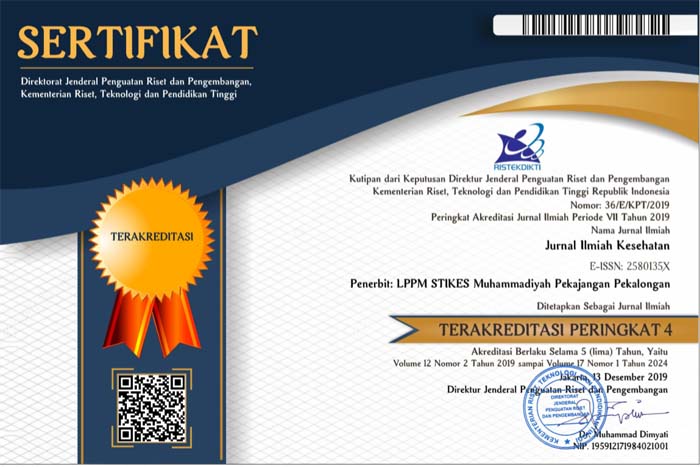Adolescent Pregnant Mother's Health Seeking Practice Using Whatsapp During Covid-19 Pandemic In Indonesia: A Qualitative Analysis Of An Open-Ended Questionnaire Among Pregnant Adolescents
DOI:
https://doi.org/10.48144/jiks.v16i1.1413Keywords:
adolescent pregnant mother, healthcare-seeking practice, online counseling, WhatsApp groupAbstract
Adolescents pregnant mothers can potentially have a problem related to their immature physics and psychology. Their health-care-seeking practice is essential to ensure that adolescent pregnant mothers receive adequate care during their pregnancy. During the COVID-19 pandemic, online media should be perceived as an alternative way to help adolescents seek care during pregnancy. This study aimed to explore the experiences of pregnant adolescent mothers who had practiced health-care seeking and followed online counseling using WhatsApp groups. This qualitative survey recruited 16 Indonesian pregnant mothers aged 15-19 who had followed WhatsApp online counseling. An open-ended questionnaire was used to collect data, which were analyzed using thematic content analysis. There were three themes related to pregnant adolescent care-seeking practices using WhatsApp groups: experience, benefits, and advice and hope. The experience had three sub-theme: present experiences, previous experiences, and hindering factors. The benefits had sub-themes: benefits of WhatsApp counseling and benefits of Group WhastApp. Their hopes and advices were: no advice, be polite, be consistent, be patient, and be duplicated by others. Adolescent pregnant mothers had good experiences in practicing health-care seeking using WhatsApp groups. They were more enthusiastic about following the counseling process and found beneficial information and solution regarding their problem during pregnancy. The findings show that providing WhatsApp groups for adolescent pregnant mothers could benefit them.
References
. Wong, S. P. W., Twynstra, J., Gilliland, J. A., Cook, J. L., & Seabrook, J. A. (2020). Risk Factors and Birth Outcomes Associated with Teenage Pregnancy: A Canadian Sample. Journal of pediatric and adolescent gynecology, 33(2), 153-159. https://doi.org/10.1016/j.jpag.2019.10.006
Goossens, G., Kadji, C., & Delvenne, V. (2015). Teenage pregnancy: a psychopathological risk for mothers and babies?. Psychiatria Danubina, 27 Suppl 1, S499-S503.
Siegel, R. S., & Brandon, A. R. (2014). Adolescents, pregnancy, and mental health. Journal of pediatric and adolescent gynecology, 27(3), 138-150. https://doi.org/10.1016/j.jpag.2013.09.008
Rabbani, U., Saigul, A. A., Sulaiman, A., & Ibrahim, T. H. (2021). Impact of COVID-19 on Antenatal Care Utilization Among Pregnant Women in Qassim, Saudi Arabia. Cureus, 13(11), e19554. https://doi.org/10.7759/cureus.19554
Rasmussen, S. A., Smulian, J. C., Lednicky, J. A., Wen, T. S., & Jamieson, D. J. (2020). Coronavirus Disease 2019 (COVID-19) and pregnancy: what obstetricians need to know. American journal of obstetrics and gynecology, 222(5), 415–426. https://doi.org/10.1016/j.ajog.2020.02.017
Enyama, D., Balti, E. V., Simeni Njonnou, S. R., Ngongang Ouankou, C., Kemta Lekpa, F., Noukeu Njinkui, D., Fouogue, J. T., Mayouego Kouam, J., Njateng, G. S. S., Kenfack, B., Watcho, P., & Choukem, S. P. (2021). Use of WhatsApp®, for distance teaching during COVID-19 pandemic: Experience and perception from a sub-Saharan African setting. BMC medical education, 21(1), 517. https://doi.org/10.1186/s12909-021-02953-9
Neo, P. H., Lim, J. M., Tan, R. K., & Ong, S. E. (2022). Using WhatsApp Focus Group Discussions to Collect Qualitative Data Collection During a Pandemic: Exploring Knowledge, Attitudes, and Perceptions of COVID-19 in Singapore. International journal of qualitative methods, 21, 16094069221090355. https://doi.org/10.1177/16094069221090355
Neo, P. H., Lim, J. M., Tan, R. K., & Ong, S. E. (2022). Using WhatsApp Focus Group Discussions to Collect Qualitative Data Collection During a Pandemic: Exploring Knowledge, Attitudes, and Perceptions of COVID-19 in Singapore. International journal of qualitative methods, 21, 16094069221090355. https://doi.org/10.1177/16094069221090355
Mosadeghrad A. M. (2013). Healthcare service quality: towards a broad definition. International journal of health care quality assurance, 26(3), 203–219. https://doi.org/10.1108/09526861311311409
Majumdar, Arun K., 2019, Chapter 11 - Conclusions and Discussion,
Optical Wireless Communications for Broadband Global Internet Connectivity, Elsevier, p 281-282, ISBN 9780128133651, https://doi.org/10.1016/B978-0-12-813365-1.00011-4.
Trude ACB, Martins RC, Martins-Silva T. A WhatsApp-based intervention to improve ma - ternal social support and maternal-child health in Southern Brazil: the text-message interven - tion to enhance social support (TIES) feasibil - ity study. Inquiry 2021; 58:469580211048701.
Ardiyanti, S., Mufdilalh,Kusumawati, W., Nugroho, WS. 2020. WhatsApp Group Increase Antenatal Visit. International Journal of Health Science and Technology, 2 (1), 2020, 01-06. DOi: 10.31101/ijhst.v2i1.1817
Price B. (2015). Understanding attitudes and their effects on nursing practice. Nursing standard (Royal College of Nursing (Great Britain) : 1987), 30(15), 50–60. https://doi.org/10.7748/ns.30.15.50.s51












